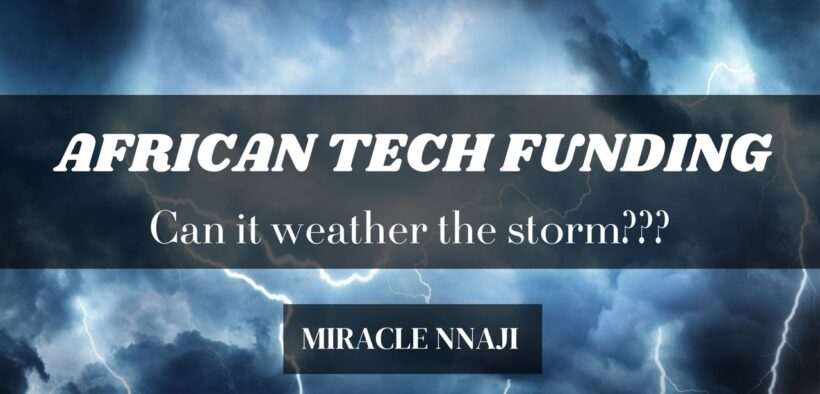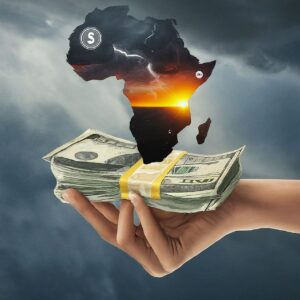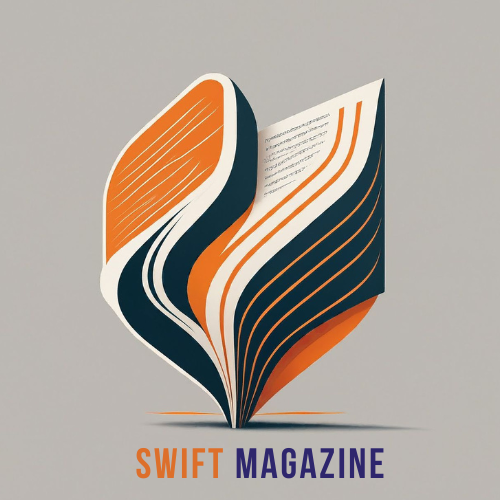African Tech Funding: Can it weather the storm???
Share

Background
At the beginning of the year, many experts predicted a gloomy outlook for startup fundraising activities, reflecting the harsh economic events of 2022. For instance, the interest rate hikes by major economies and the consequent funding winter were major concerns.

While Africa was somewhat shielded in 2022, the fortress didn’t hold through in 2023. The total funding raised by African startups experienced a massive 46% drop, from $6.4 billion in 2022 to $3.5 billion in 2023. Notably, debt funding accounted for nearly 34% of total funding raised for the first time in a decade, highlighting the difficulty in raising equity capital.
With inflation staying high at the beginning of the year and no signs of interest rate cuts, many experts feared further turbulence for the African tech ecosystem, including funding declines, shutdowns, and exits. Half-year results published by TechCabal confirmed these fears, except for exit activities rebounding compared to the same period in 2023.
Setting the Context
Let’s take a trip back to 2022. Following the Russian-Ukrainian war, supply chain challenges led to rising inflation rates. Central banks of developed nations rolled out aggressive contractionary monetary policies to combat inflation, leading to hikes in interest rates.
This, in turn, impacted the funding available for risky investment bets like investments in startups. Shockwaves were sent across the globe, with global funding registering a 35% decline year-on-year in 2022 compared to 2021. As all watched Africa for similar corrections, it turned out that Africa prevailed over the headwinds that took over even the most resilient ecosystems, registering 8% growth year-on-year.
Many attributed this resilience to strong early-stage deal activity and better fundamentals, such as a skilled talent pool, a supportive entrepreneurial environment, widespread access to technology, and the digitization of key sectors. This reinforced the narrative that African tech was the next big thing for global investors. However, by 2023, it became clear that these fundamentals could no longer hold back the market correction.
Across all major metrics, such as deal value and activity, there was a significant decline. According to Partech, deal value dropped by 46%, and the total number of deals fell by 28%, returning to levels slightly higher than those before 2021. Additionally, many startups faced shutdowns, and those that managed to survive had to significantly reduce their valuations to attract investors.
An interesting aspect of these activities is the decline in the number of unique investors. From a record high of 1,149 investors in 2022, the number dropped to 569 in 2023, representing a 50% decline. The pullback of mostly foreign investors exposed the vulnerabilities of the African tech ecosystem to downturns in foreign capital inflow.
To put this in perspective, consider the year-on-year funding decline across the big four African markets: Nigeria, South Africa, Kenya, and Egypt. According to the Partech report, there are inconsistent patterns in year-on-year funding declines.
While Egypt, Kenya, and Nigeria saw declines in investor participation of 56%, 50%, and 47% respectively, South Africa showed only a 9% decline in investor participation. This suggests a more active presence of local investors in funding startups. It reinforces the point that increased local investor participation would make the African tech ecosystem more resilient to such headwinds.
H1 2024: The Bleeding Continues
Major predictions by experts at the start of 2024 foresaw more funding difficulties for African startups. Economic indicators, such as inflation remaining above the target rate of 2%, along with geopolitical tensions like the Israel-Hamas conflict, the Russia-Ukraine war, and the upcoming US elections, suggested that interest rates would stay high. Consequently, this would lead to less funding flowing to startups and stalled exit activities, whether through IPOs or acquisitions, pushing investors to seek alternative exit paths to generate returns.
The actual results for H1 2024 do not deviate much from predictions. The half-year report published by Techcabal Insights, titled “The State of Tech in Africa,” revealed further headwinds for startup investments.
The total funding for the first half of the year was $779.7 million for the entire continent. Considering that Q1 saw $466.3 million and Q2 saw $313.4 million, this indicates a quarter-on-quarter decline and a 54% drop compared to the half-year results for 2023. This decline affected both equity and debt funding, with debt decreasing by 38% and equity by 24%.
The big four African markets, while accounting for 67% of total funding, experienced significant declines across the two quarters in 2024. For instance, Nigeria saw a sharp drop from $159.75 million in total funding raised in Q1 2024 to around $12.4 million in Q2. South Africa experienced a similar significant drop. Egypt’s decline was milder, at just 11.6%. Kenya was the only country among the big four to record growth in fundraising, increasing from $108.44 million in Q1 to $135.8 million in Q2.
Sector-wise, similar declines were observed. Historically well-funded sectors like fintech, healthcare, and energy & water suffered declines of over 50%. Only logistics and transport saw an unusual 160.84% increase in funding in H1 2024 compared to H1 2023.
The funding decline was also accompanied by stories of shutdowns, signaling that the correction was ongoing. Coin Mara reported losses of $15.9 million in 2022, even before shipping a product. Blacopper had to lay off 75% of its staff due to mounting debts exceeding N1 billion.
Amidst the gloom, there were also signs of recovery in mergers and acquisitions, which grew from 17 in H1 2023 to 19 in H1 2024. While this is a mild improvement, it remains below the levels seen in the same period in 2022.
South Africa accounted for 50% of the total acquisitions, which raises the question of whether there was truly a recovery, considering the heavy skewness towards South Africa, which is a more mature market.
Outlook for the Rest of 2024

Sadly, it doesn’t look like interest rates will come down anytime soon. As a result, startups are expected to face more difficulty in raising capital, and this challenge extends to VC funds that need to raise capital to invest in startups.
Although large institutions like Visa have committed to investing $1 billion and have already launched an accelerator for fintech founders, which will significantly increase the number of investments by the end of the year, the overall fundraising environment remains tough.
Existing startups will need to focus heavily on survival strategies, such as pivoting business models and pursuing revenue growth through product diversification to stay afloat. Unfortunately, Africa is not well-positioned for government bailouts through capital injections. Additionally, with local investors still risk-averse and preferring traditional investment classes, a recovery is not expected anytime soon.
Author: Micheal Nnaji
Subscribe to our Newsletter for more insightful articles and updates.







